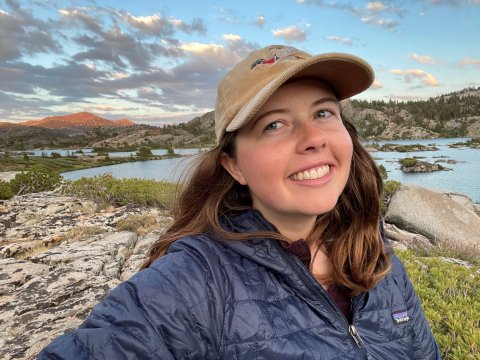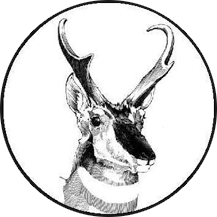Donald W. and Glennis A. Kaufman Research Award
About the Committee
Chair
-
Elmer J. Finck (ejfinck@fhsu.edu)
Members
|
|
History and Mission
The Kaufman Award was established with a substantial gift by anonymous patrons with the goal of supporting field-based ecological research, conducted in the grasslands of the Great Plains states and/or Canada Prairie Provinces by graduate student (MS or PhD) members of the American Society of Mammalogists (ASM), focusing on native mammals with a preference given to research focused on rodents and/or shrews. See “Grants & Awards” tab for further details. A single $2,500 award is available annually to qualified students enrolled in a MS or PhD program. The nationality of the applicant is not considered in reviewing applications, and students do not need to be enrolled in graduate programs in the United States.
2023 Kaufman Award Recipient
|
Image
 |
Emma Balunek is an MS student in the Applied Science program at the University of Nebraska-Lincoln. Her research focuses on the coyote-badger hunting relationship. Coyotes and badgers in western North America sometimes hunt prairie dogs and ground squirrels together using their complementary hunting skills. Specifically, the badger digs up burrowing animals, while the coyote captures prey that flushes above ground and surveys the surrounding area. This collaborative partnership has been documented by Indigenous folk for thousands of years, but little is understood about the behavioral and ecological mechanisms underlying this relationship. Her project is formulated specifically to help fill this knowledge gap. Photos and videos inform both the research and aid with the storytelling aspect of her project which aims to bring attention to the often-overlooked grasslands and the other species that call it home. See more information here. |
Donate Now!
You can donate to the Donald W. and Glennis A. Kaufman Research Award (and others) here.
Reports
Grants & Awards
Research that may be funded by the Kaufman Award.
The Kaufman Award was developed to fund field-based research on community, population, or behavioral ecology of native mammals with a preference given to research focused on small rodents and/or shrews. It is expected that at least some field sites will be located in native prairie (including those that are burned or moderately grazed) and/or in restored prairies (e.g., as a treatment or as a control). These sites would provide a comparison to sites that have experienced land-use changes, such as those from agriculture (i.e., cultivation for crops, planting of livestock forages, re-seeding of old fields or planting CRP acreages to name a few examples) or from woody expansion or urban sprawl into the fire-adapted and grazing-adapted prairie ecosystems.
The proposed research must be conducted in the region known as the Great Plains, which includes parts of 10 states—Colorado, Kansas, Montana, Nebraska, New Mexico, North Dakota, Oklahoma, South Dakota, Texas, and Wyoming—as well as the three Prairie Provinces of Canada—Alberta, Manitoba, and Saskatchewan.
How can funds from the new research award be used?
The research award should support travel costs to visit research sites, but may also support associated equipment or analytical costs. The award will not cover travel to meetings, stipends or salaries of any kind, or living expenses.
Application requirements
The Kaufman Award is be a competitive research award based on merit (not financial need). Proposals will be evaluated on the basis of the quality of the science, originality, suitability of proposed methods, and on the likelihood that the research will contribute to our understanding of the ecology of native mammals, especially rodents and/or shrews, in the Great Plains and Canada Prairie Provinces. Strong preference will be given to innovative and meritorious ideas; this research award is not based on financial need.
Applicants should submit a research proposal (3-page limit, 12 point Times New Roman font, full 1” margins). The proposal must include an introduction to provide broader scientific context; a clear description of the proposed research, including questions/hypotheses to be addressed; objectives; methods (including proposed field sites); and any preliminary results that are available and applicable. Proposals should include one additional page to describe how Kaufman Award funds would be used, and one page to explain how the project would be expanded in scope with additional funds in future years. A curriculum vita (maximum three pages) should include: education, past or current research project, past research support, any other requested support for the proposed research, and a list of publications and presentations of research (if any) at national or international meetings. The applicant should arrange for two letters of recommendation (one must be from the graduate advisor) to be submitted to the committee (these are NOT to be submitted with the application).
To encourage multi-year and large-scale research, students may receive the award more than one time. Eligible students should outline in each research proposal how they would expand their study with additional funding.
See the grants page for current submission dates.
Recipients
2020+
- 2020—John Stuhler, Texas Tech University
- 2021—Katherine Biardi, California State University, Fullerton
- 2022—Ryan Hanscom, San Diego State University and University of California, Riverside
- 2023—Emma Balunek, University of Nebraska, Lincoln
- 2024—Jessie Bainbridge, University of Regina
